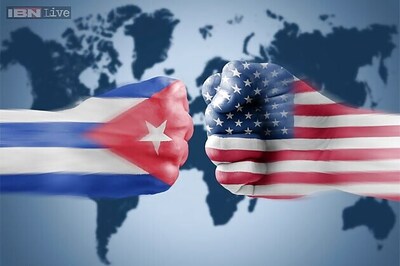
views
Sydney: The global expansion of nuclear energy is not a threat to the non-proliferation regime, but the greatest risk is from terrorists who could build a dirty bomb with nuclear waste from a medical facility, industry experts said.
"Nuclear power plants are essentially fortresses. It is very difficult for a terrorist to contemplate a way to obtain material from a nuclear power plant and put it to malicious use," director general of the World Nuclear Association, John Ritch said on Monday.
North Korea's first nuclear test last week and Iran's moves to create a nuclear power program have heightened concerns, particularly in Washington, on nuclear weapons proliferation.
Ritch, speaking at the 15th Pacific Basin Nuclear Conference in Sydney, said North Korea's claimed test and Iran's nuclear program were the result of their "strategic posture" and not the proliferation of nuclear energy.
"We could have a 20 fold increase of nuclear energy use around the world and it would not either increase or decrease the problems posed by countries like North Korea or Iran.
They are separate geopolitical areas and must be seen as such," he said.
"The most plausible danger of a radiological device is that certain kinds of radiological material might be obtained from hospitals or other users," Ritch said.
Nuclear energy was undergoing a "renaissance" driven by Asia, and in particular China, which would see a total of 40 nuclear-powered countries in the next 25 years, he said.
There are currently 442 nuclear power plants in 30 countries, accounting for 16 per cent of global energy, with almost 30 new nuclear plants being constructed in 11 countries.
"We will be moving from the current rate of some 440 reactors to a world in the next 25 years in which we have more than 1,000 reactors, and by the mid-century I would expect we would have 2,000 to 3,000 reactors in the world," Ritch said.
China currently has nine nuclear power plants, but to fuel its rapid economic growth plans to build two to three nuclear plants each year for 15 years, said Changli Yang, vice president of China National Nuclear Corporation.
Japan has 55 nuclear plants, producing one third of energy needs, and is constructing two more plants, awaiting a license for four and plans several more within 10 years, said Shunsuke Kondo, chairman of the Atomic Energy Commission of Japan.
Kondo said that in order for Japan to expand its industry it must ensure the public believes nuclear plants are safe and secure.
"We should recognize though that the nuclear non-proliferation regime remains under strain with challenges such as the nuclear issues of Iran and North Korea," he said.
"The alleged nuclear test by North Korea is absolutely unacceptable as it gives a blow to the international community's efforts for nuclear non-proliferation."
South Korea commissioned its first nuclear plant in 1978 and now has 20 plants supplying about 40 per cent of electricity.
Under its nuclear construction plan, South Korea will build six new plants between 2010 and 2016, said Joong-Jae Lee, president of Korea Hydro & Nuclear Power Co.
Many speakers at the conference said the expansion of nuclear power was being driven not only by economic growth, but a desire for clean energy to combat global climate change.
"We are now seeing a global collision of economic and greenhouse challenges which has brought nuclear power sharply into focus," said Australian Energy Minister Ian MacFarlane.
















Comments
0 comment